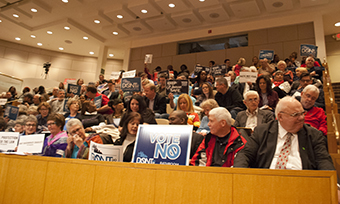By Bob Allen
The city council in Charlotte, N.C., passed an ordinance Feb. 22 to prevent businesses from discriminating against LGBT customers, setting the stage for a battle with the Republican-controlled state legislature.
Council members voted 7-4 in favor of a measure expanding the city’s existing non-discrimination ordinance based on race, gender, religion, national original, ethnicity, age or disability to include protection based on sexual orientation and gender expression and identity.
The ordinance applies to places of “public accommodation,” such as restaurants and stores. The most controversial part allows people to choose restrooms corresponding to the gender with which they identify.
 More than 21,500 people signed petitions opposing the measure in an online campaign called “Don’t Do It Charlotte,” while a coalition of supporters mobilized around a movement called “Turn Out! Charlotte.”
More than 21,500 people signed petitions opposing the measure in an online campaign called “Don’t Do It Charlotte,” while a coalition of supporters mobilized around a movement called “Turn Out! Charlotte.”
“My support of the non-discrimination ordinance is based in the same faith that grounded the civil rights movement in this country that worked to ensure non-discrimination and equal access for people of color to public restrooms, restaurants and water fountains in America,” said Benjamin Boswell, pastor of Myers Park Baptist Church in Charlotte. “With regard to the equality of transgender persons, my faith is rooted in Jesus’ command that we ‘love our neighbors as ourselves’ and Paul’s liberating words to the Galatian church, ‘There is no longer Jew or Greek, there is no longer slave or free, there is no longer male and female; for all of you are one in Christ Jesus.’ What else needs to be said?”
Russ Dean, co-pastor of Park Road Baptist Church in Charlotte, also supported the ordinance, noting, “Christian scripture says ‘for freedom (not for discrimination) Christ has set us free.’ It is the narrow-mindedness of discrimination, based on lack of understanding and compassion that binds freedom, not the other way around.”
Meanwhile, Mark Harris, senior pastor of First Baptist Church in Charlotte, spoke to more than 700 protesters gathered outside the Charlotte-Mecklenburg Government Complex Building for two hours leading up to the vote.
“We in Charlotte are united together as citizens, faith leaders, business owners, mothers and fathers, to let you know that your voice will not be the last one standing,” Harris, a past president of the Baptist State Convention of North Carolina, said in comments quoted by the Biblical Recorder.
“You have received nearly 250,000 emails urging you to vote ‘no’ to allowing men to enter women’s bathrooms and locker rooms,” said Harris, who ran unsuccessfully for the U.S. Senate in 2014. “Should you choose to ignore this resounding voice of the people by passing this extreme ordinance, it is not us that will lose today,” Harris said. “It will be the women and children of this city that you have willingly and knowingly placed in harm’s way. We will not stop until they are protected and safe once more.”
Access to restrooms figured prominently in opponents’ arguments against the new law.
Republican Gov. Pat McCrory, formerly mayor of Charlotte, said the bathroom provision would likely cause “immediate” action by legislators. He said the change could “create major public safety issues by putting citizens in possible danger from deviant actions by individuals taking improper advantage of a bad policy.”
North Carolina House Speaker Tim Moore, a Republican and member of First Baptist Church of Kings Mountain, N.C., said lawmakers will take steps “to correct this radical course.”
But Boswell said those arguments are misguided.
“Opposition to the ordinance was based on a hatred of transgender people that was (sometimes) masked in a false desire to protect children in public restrooms,” he said. “The defense of the opposition by religious leaders in the community here was grounded in the traditional misinterpretations of the Bible that are typically used to shame and demonize people of different sexual orientation and gender identity. … Even if such scriptures were found, those opposed to the ordinance would have to defend why transgender people are more dangerous than anyone else in a public restroom, which would simply lead them back to the biblical passages used to shame and demonize transgender people. It is deceitful circular logic that uses safety of children to support a position of hatred, discrimination, inequality and exclusion.”
Dean agreed. “Some people of faith have sincere concerns about the ‘unintended consequences’ this ordinance will expose to the public. Those concerns will soon be rendered baseless. The loudest voices in protest, however, come from a fear of difference and religious condescension. Such fear and condescension are contrary to the spirit of Jesus and detrimental to the cause of Christ.
“Those who are truly free have nothing to fear from this ordinance, nor those it will protect.”
Others voicing opposition to the ordinance included evangelist Franklin Graham, who leads both the Charlotte-based Billy Graham Evangelistic Association and Samaritan’s Purse charity headquartered in Boone, N.C., and Alan Blume, editor of the official news journal of the Baptist State Convention of North Carolina.
Baptist minister Tim Moore, a supporter of the ordinance, said the measure offers hope to Charlotte’s LBGT community.
“LGBTQ persons just want to live and work and worship like everyone else in this city,” said Moore, a former pastor of Sardis Baptist Church in Charlotte and now a writer-in-residence in the city. “Instead of acceptance, too often they are misunderstood, ostracized, or even attacked because of who they are. Last fall around the time this ordinance was first discussed two transgender youth committed suicide. It’s hard not to think that the hate speech in the media contributed to their hopelessness. Even if the North Carolina state legislature supersedes this city ordinance, it is still a message of hope to the LGBTQ community. Maybe one day Christ’s Church will be as welcoming.”
Previous story:
Battle over LGBT discrimination hits Charlotte
Related commentary:
The fallacy in opposing ‘bathroom bills,’ by Russ Dean
